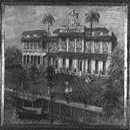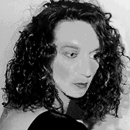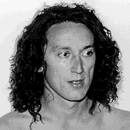Konstantinopel,
December 1st...


...he stretched
himself. He rose.He stood upright in complete nakedness before us, and
while trumpets pealed Truth! Truth! Truth! we have no choice left but confess
- he was a woman.
No human being,
since the world began, has ever looked more ravishing. His form
combined in one the strength of a man and a woman's
grace.  As
he stood there, the silver trumpets prolonged their note, as if reluctant
to leave the lovely sight which their blast had called forth; and Chastity,
Purity, and Modesty, inspired, no doubt, by curiosity, peeped in at the
door and threw a garment like a towel at the naked form which, unfortunately,
fell short by several inches. Orlando looked himself up and down in a long
looking-glass, without showing any signs if discomposure, and went, presumably,
to his bath. As
he stood there, the silver trumpets prolonged their note, as if reluctant
to leave the lovely sight which their blast had called forth; and Chastity,
Purity, and Modesty, inspired, no doubt, by curiosity, peeped in at the
door and threw a garment like a towel at the naked form which, unfortunately,
fell short by several inches. Orlando looked himself up and down in a long
looking-glass, without showing any signs if discomposure, and went, presumably,
to his bath.
We may take
advantage of this pause in the narrative to
make certain statements. Orlando had become a woman - there is no denying
it. But in every other respect, Orlando remained precisely as he had been.
The change of sex, though it altered their future, did not whatever
alter their identity.  Their
faces remained, as their portaits prove, practically the same. His memory
- but in the future we also must, for convention's sake, say "her" for
"his" and she" for "he" - her memory then, went back through all the events
of her past life without encountering any obstacle. Some slight haziness
there may have been, as if a few dark drops had fallen into the clear pool
of memory, certain things had become a little dimmed, but that was all.
The change seemed to have been accomplished painlessly and completely and
in such a way that Orlando herself showed no surprise at it. Many people,
taking this into account, and holding that such a change of sex is against
nature, have been at great pains to prove (1) that Orlando had always been
a woman, (2) that Orlando is at this moment a man. Let biologists and psychologists
determine... Their
faces remained, as their portaits prove, practically the same. His memory
- but in the future we also must, for convention's sake, say "her" for
"his" and she" for "he" - her memory then, went back through all the events
of her past life without encountering any obstacle. Some slight haziness
there may have been, as if a few dark drops had fallen into the clear pool
of memory, certain things had become a little dimmed, but that was all.
The change seemed to have been accomplished painlessly and completely and
in such a way that Orlando herself showed no surprise at it. Many people,
taking this into account, and holding that such a change of sex is against
nature, have been at great pains to prove (1) that Orlando had always been
a woman, (2) that Orlando is at this moment a man. Let biologists and psychologists
determine...
Virgina
Woolf: "Orlando", The Hogarth Press 1928, published in Penguin Books, London
1993, page 97/98.

|

 As
he stood there, the silver trumpets prolonged their note, as if reluctant
to leave the lovely sight which their blast had called forth; and Chastity,
Purity, and Modesty, inspired, no doubt, by curiosity, peeped in at the
door and threw a garment like a towel at the naked form which, unfortunately,
fell short by several inches. Orlando looked himself up and down in a long
looking-glass, without showing any signs if discomposure, and went, presumably,
to his bath.
As
he stood there, the silver trumpets prolonged their note, as if reluctant
to leave the lovely sight which their blast had called forth; and Chastity,
Purity, and Modesty, inspired, no doubt, by curiosity, peeped in at the
door and threw a garment like a towel at the naked form which, unfortunately,
fell short by several inches. Orlando looked himself up and down in a long
looking-glass, without showing any signs if discomposure, and went, presumably,
to his bath.
 Their
faces remained, as their portaits prove, practically the same. His memory
- but in the future we also must, for convention's sake, say "her" for
"his" and she" for "he" - her memory then, went back through all the events
of her past life without encountering any obstacle. Some slight haziness
there may have been, as if a few dark drops had fallen into the clear pool
of memory, certain things had become a little dimmed, but that was all.
The change seemed to have been accomplished painlessly and completely and
in such a way that Orlando herself showed no surprise at it. Many people,
taking this into account, and holding that such a change of sex is against
nature, have been at great pains to prove (1) that Orlando had always been
a woman, (2) that Orlando is at this moment a man. Let biologists and psychologists
determine...
Their
faces remained, as their portaits prove, practically the same. His memory
- but in the future we also must, for convention's sake, say "her" for
"his" and she" for "he" - her memory then, went back through all the events
of her past life without encountering any obstacle. Some slight haziness
there may have been, as if a few dark drops had fallen into the clear pool
of memory, certain things had become a little dimmed, but that was all.
The change seemed to have been accomplished painlessly and completely and
in such a way that Orlando herself showed no surprise at it. Many people,
taking this into account, and holding that such a change of sex is against
nature, have been at great pains to prove (1) that Orlando had always been
a woman, (2) that Orlando is at this moment a man. Let biologists and psychologists
determine...